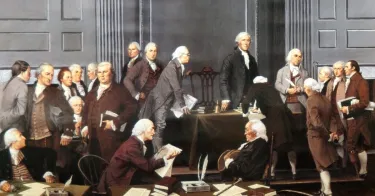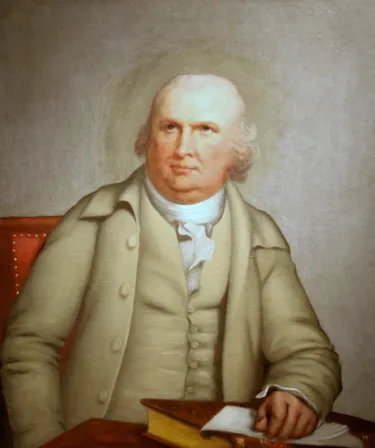The Newburgh Conspiracy

Following the victory at Yorktown, Virginia on October 19, 1781, the Revolutionary War was at a conclusion. Peace talks between British and American diplomats began, and the Confederation Congress began to see the military as an unneeded expense. In 1780, Congress passed legislation that included a lifetime of half of a soldier’s regular pay when they were discharged from service. This legislation, however, was halted in 1782 when Robert Morris cut off funding to the Continental Army to save money. Throughout Continental Army camp in Newburgh, New York, soldiers and senior officers drafted petitions for the Confederation Congress to maintain funding to the army. Under Major General Henry Knox, officers and soldiers drafted a memorandum to the Confederation Congress in the hope of once again receiving pay. In December of 1782, a group of senior Continental Army officers including Major General Alexander McDougall, Colonel John Brooks, and Colonel Matthias Ogden delivered the memorandum to the Confederation Congress. The memorandum asked for an option for a lump sum payment for their pensions and back pay instead of lifetime payments. It also expressed their distress over their lack of pay. Included in the memorandum was also a threat, it explained, “Any further experiments on [the Army’s] patience may have fatal effects.”

The reasoning for these officer’s displeasure in the Confederation Congress stems from the idea that the soldiers believed that their service in the eyes of the government and civilians would go underappreciated. The soldier’s long-term absence from civilian life meant that they would need to readjust and adapt to a new home that adapted in their own absence. Without that pension from the Confederation Congress, many soldiers and officers alike would be left penniless and jobless.
In Congress, the debate over whether to pay the Continental Army heated. Due to the Articles of Confederation, Congress did not have the power to tax, but the states did. Moreover, Congress was responsible for maintaining a standing army, and Congress was $6 million in debt, with only $125,000 in assets with other war debts to pay off. In lieu of the inability to tax, Congress could also only ask for funding from the states, foreign governments, and by selling Western lands. Congress could also not draft soldiers, and they could not regulate trade. Representatives from certain states also barred their state’s representative from supporting any lifetime pension for soldiers. Some members of the Confederation Congress supported the funding of the Continental Army, such as Alexander Hamilton, James Madison, Gouverneur Morris, and Robert Morris. Those in favor of funding the Continental Army called a meeting with the group of senior officers who delivered the memorandum. By January 6, 1783, a Congressional committee was created to address the officers and the memorandum. Committee members argued for a lump sum of funds, rather than the half-pay for lifetime payments. Committee meetings were fruitless, however. Secrecy plagued the committee members, and opposition to the committee grew. The looming idea of peace and ultimate victory over the Revolution overtook the Continental Army’s needs. The Confederation Congress was unwilling to finance the soldier’s pensions. Upset and desperate, Continental Army officers gathered under Major General Horatio Gates, a long-time rival of George Washington's, planned to use force.

On February 8, 1783, a plot began. Colonel John Brooks returned to Newburgh with two letters. One letter was from Alexander McDougall and Matthias Ogden which was addressed to the entire army about the poor situation in Philadelphia. The other letter was a private letter for Henry Knox from Gouverneur Morris addressing Knox about the situation. Four days later, on February 12, another letter from McDougall, signed under the pseudonym Brutus, explained that Knox may be required to start a mutiny and refuse to demobilize until they are rightfully paid. The following day, rumors of peace between Great Britain and the new nation began to unfold, causing distress among those in Congress who supported paying the Continental Army. Alexander Hamilton wrote to George Washington, urging him to support the Continental Army’s plight. Washington, however, sympathized with both the Continental Army and Congress. Washington explained to Hamilton, “To me…it is clearly my opinion, unless Congress have powers competent to all general purposes, that the distresses we have encountered, the expences we have incurred, and the blood we have spilt in the course of an Eight years war, will avail us nothing.” On February 21, 1783, Henry Knox replied to McDougall and Morris in a letter that explained that the Continental Army, “is a sharp point which…will never be directed [other] than against the Enemies of the liberties of America.”
In March of 1783, an anonymous letter circulated throughout the Newburgh camp calling for an ultimatum to be sent to Congress demanding their pay. Washington, however, caught wind of this letter and called for a meeting coincidentally on March 15, the Ides of March. Officers believed that Washington would not attend the meeting and they believed that Washington was accepting of the conspiracy. On March 15, to all officer’s surprise, Washington came to the Newburgh camp and walked into the large wooden temple where the meeting was held. As Washington entered, Major General Horatio Gates ceded the floor to Washington. Washington, while sympathetic towards the soldiers that he commanded in the eight-year-long war against the most powerful military in the world, addressed his fellow officers with a lengthy speech denouncing their tactics of coercion upon Congress. In an impassioned address, Washington spoke out against the anonymous letter that went around the camp, “...let me conjure you, in the name of our common Country--as you value your own sacred honor—as you respect the rights of humanity, & as you regard the Military & national character of America, to express your utmost horror & detestation of the Man who wishes, under any specious pretenses, to overturn the liberties of our Country, & who wickedly attempts to open the flood Gates of Civil discord, & deluge our rising Empire in Blood.” He further explained to the officers, “let me request you to rely on the plighted faith of your Country, and place a full confidence in the purity of the intentions of Congress…” Following the Newburgh Address, Washington read a letter from Joseph Jones, a Virginia member of Congress, to the angered officers. The letter’s contents assured Congress’ good intentions. While reading the letter, Washington took out a pair of reading glasses. He then said to the officers, “Gentlemen, you will permit me to put on my spectacles, for I have not only grown gray but almost blind in service of my country.” The combination of Washington’s surprise arrival, the Newburgh Address, Washington’s need to put on his reading glasses, and his comments about his service to his country all caused the officers to see their wrongdoings. Some officers openly wept in reaction to Washington’s show of vulnerability to them. After Washington left the temple, most of the officers overwhelmingly supported Washington's admirable intentions, and the officers put their faith back into the Confederation Congress to await their payment. Two days following Washington’s surprise arrival to the Newburgh camp, news of it spread to Philadelphia. Copies of Washington’s address spread throughout the city. On March 19, 1783, Congress voted to allow commutation for all soldiers in the form of full pay for five years.
The Newburgh Conspiracy was one of the nation’s first troubles as a new nation. Washington fermented the seeds of patriotism and valor in the Continental Army in the Newburgh camp. The Newburgh Conspiracy, while highlighting the issues of the Articles of Confederation, showed that Washington had the leadership capabilities to become the nation’s first President. The Newburgh Conspiracy is one of Washington’s greatest non-military accomplishments before his ascension to the Presidency. With the help of Washington, the young nation averted a possible coup d'état or civil war.
Further Reading:






